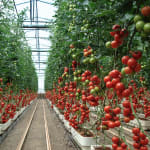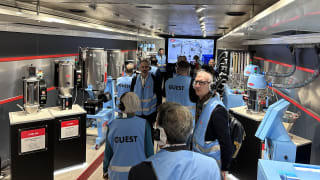
BASF, the global leader in the field of high-quality and innovative antioxidants and light stabilizers world-wide, expands its NOR technology to help farmers continuously produce in a sustainable way.
With an increasingly demanding growing population, modern farming faces many challenges including how to balance the need for greater yields of fruits and vegetables, whilst simultaneously meeting the ever-stringent environmental protection requirements of organic food production.
By using the energy from the sun in a world with less arable land and increasing water scarcity, Plasticulture – the use of plastic materials in agricultural applications, contributes significantly to producing more and better food all year. Prominent examples of Plasticulture’s high efficiency to use natural resources in a sustainable manner include: greenhouse covers which keep uniform temperature and humidity for continued food production; mulch films and irrigation pipes which reduce water consumption; and silage films which store livestock food in a cost-effective way.
“The development of Tinuvin NOR 356 is the result of BASF’s extensive competency in light and thermal stabilization combined with our deep knowledge of agricultural market requirements,” said Volker Bach, head of BASF’s Global Competence Center Plastics Additives, BASF. “Our organic farming customers can benefit from higher yields produced in a sustainable way.”
Tinuvin NOR 356 protects and extends the lifetime of agricultural films that are exposed to very high levels of UV radiation, heat and crop treatments such as elemental sulfur, and the compounds approved in certified organic farming to prevent plants diseases and fertilize the soil.
Strong commitment to the agriculture industry
When exposed to the sun’s intense radiation and agrochemicals, a series of complex chain reactions cause the agriculture plastics to begin degradation and finally, become brittle. When added to the polymer, the Tinuvin NOR light stabilizers neutralize the complex chain reactions and disrupt the reaction cascade. This protects the agricultural films, in particular greenhouse covers, and extends their durability. Standard light stabilization solutions are not effective under these challenging conditions due to their limited resistance to agrochemicals, elemental sulfur and disinfection products.
The improved film protection and lifetime extension under NOR-stabilized greenhouse covers increase productivity, improve crop quality and reduce plastic waste for farmers which makes them more competitive.
To serve the increasing demand for organic farming, BASF has continued to invest in the NOR technology by creating this new generation NOR and expanding production capacity. In addition to the increased NOR capacity, BASF continues to invest at all key light stabilizers production sites in Pontecchio Marconi (Italy), Lampertheim (Germany), McIntosh (USA) and Puebla (Mexico).
Source: BASF



